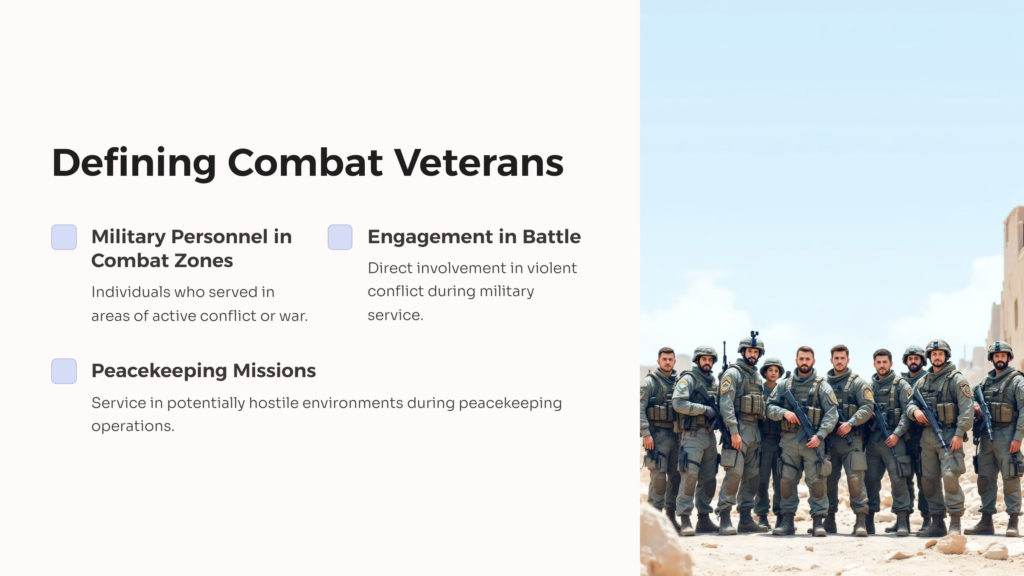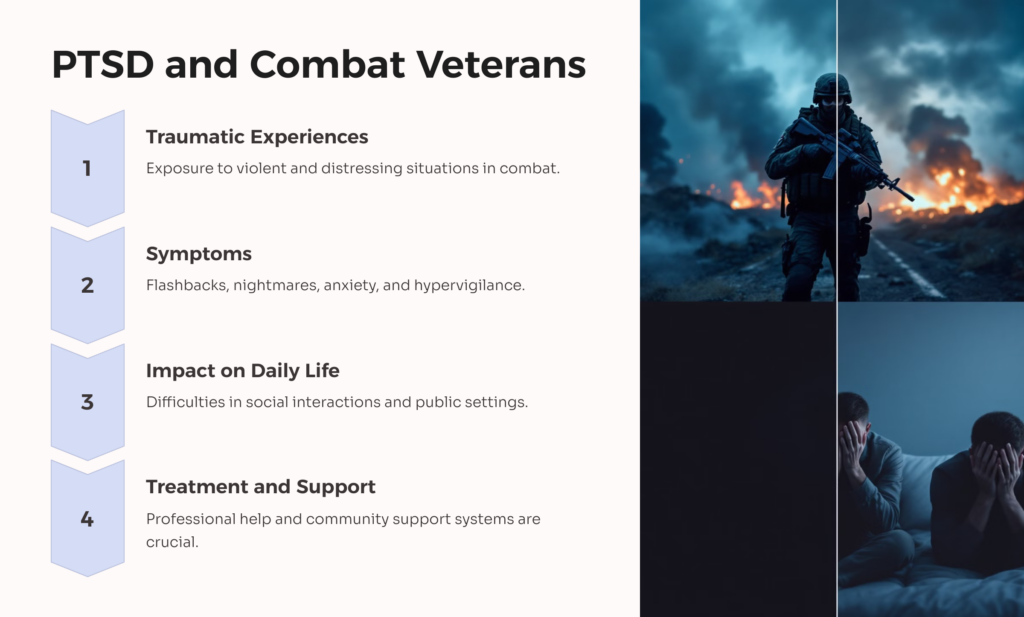A combat veteran refers to any military personnel who served in a combat zone. They are individuals who have not only committed to serving their nation but also proved their dedication through active engagement in violent conflict. It is essential for us to fully comprehend the meaning of this term, not only out of respect for their sacrifice but also to better understand the specific experiences they face during and after their service.
The issue of combat veterans is not distant or abstract; it has current, far-reaching implications. Its ability to reshape lives – those of the veterans and the ones around them – grants it a great deal of importance. This article seeks to provide insight into what it truly means to hold combat veteran status; understanding their experiences, challenges, benefits they receive, and the role they play in society.
Literally, a combat veteran is a person who has engaged in battle during their military service. This definition could include personnel from all branches of service who served in any capacity in a combat zone. However, the military or legal definition can vary slightly between nations and organizations.
For example, in the United States, the Department of Veteran Affairs defines a combat veteran as any Veterans Health Administration patient who served on active duty in a theater of combat operations during a period of war declared by the United States Congress, or in combat against a hostile force during a period of armed conflict.

Who is Considered a Combat Veteran
Becoming a combat veteran requires serving in a military role in a war zone or during a peacekeeping mission, or engaging in actual combat against the enemy. The circumstances that determine whether a military person is considered as a combat veteran usually revolve around these key scenarios. This does not negate the incredible service provided by other military personnel; however, it helps to distinguish those who have borne the weight of combat.
Contrasting combat veterans with other military personnel shows a difference in the level of exposure to violence and traumatic situations. While all military personnel provide invaluable service, combat veterans have faced particular hardships aligning directly with engaging the enemy in battle, serving in war zones, or confronting violent situations during peacekeeping missions.
Challenges Faced by Combat Veterans

A combat veteran’s journey doesn’t end after leaving the battlefield; they often face emotional, physical, and social challenges. Physically, veterans might carry the scars of wars literally, dealing with wounds and other health concerns developed during service. These can range from missing limbs to long-term diseases caused by exposure to harmful substances.
Psychologically, their sacrifices take a toll on their mental health. Drawing upon their experiences, veterans might suffer from PTSD, emotional trauma, depression, among others. Their exposure to violent and heartbreaking situations can leave lasting impacts that manifest years after their actual combat experience.
Finally, reintegrating into society poses its unique set of challenges. After experiencing the intensity of combat, adjusting to the peace and routine of civilian life can make veterans feel alienated, triggering potential social issues such as isolation or difficulties in familial relationships.
The transition can be especially difficult for those suffering from post traumatic stress disorder (PTSD), as sounds or situations that recall their traumatic experiences can elicit painful memories or reactions. Coping with PTSD can profoundly impact one’s ability to reconnect with friends and family or feel comfortable in public settings. Professional assistance and strong community support systems are critical to help these veterans process their experiences, manage their symptoms, and integrate in a healthy manner.
Benefits and Support for Combat Veterans

Recognizing the supreme sacrifice that combat veterans make in active service, governments typically offer several benefits. These include healthcare services, prioritizing them for medical, mental health, and specialty care. Additionally, they are also entitled to education benefits as a part of the GI Bill, offering financial support for schooling and training. This allows veterans with combat experience to pursue higher education and new career opportunities after their military service.
Residential benefits like Veterans Affairs home loans come of assistance when a military veteran decides to settle down into civilian life and start a family. The VA home loan program makes home ownership more accessible by requiring little to no down payment from eligible veterans. This, among many other benefits like disability compensation, pension plans, and vocational rehabilitation services, is provided to ensure a smooth transition into civilian life after risking one’s own for the country.
Besides government support at federal and state levels, numerous non-profit organizations and charities offer a range of assistance – from employment support programs that help veterans optimize their military experience into civilian jobs, to mental health services and temporary financial assistance for those struggling with post-service trauma or disabilities that make work challenging.
Support groups and events bring veterans together to find community, mentorship and access to many resources in one place. The shared experience, understanding and brotherhood veterans develop while serving often continue offering comfort and stability long after, thanks to the care and appreciation from the country they took an oath to protect.
Notable Combat Veterans
There are several notable combat veterans who have contributed immensely to society upon their return. For instance, Senator Tammy Duckworth, a U.S. Army veteran, lost both legs when her helicopter was hit during the Iraq war. Despite the challenges, she became the first disabled woman elected to the U.S. Senate. Another example is Kris Paronto, a U.S. Army Ranger who served multiple deployments in the Middle-East and North Africa. Following his military career, he has become a prominent motivational speaker and author.
These combat veterans exemplify the resilience and dedication that military service engenders; they bring the same focus that made them soldiers to their civilian endeavors, inspiring positivity with their never-give-up attitude.
Conclusion
Understanding and acknowledging the term “combat veteran” goes a long way not only in addressing their unique set of challenges but also in appreciating their sacrifice for their nations. Physical injuries, psychological trauma, and the challenges in reintegrating into society underscore the magnitude of their sacrifice. But the benefits provided and the indomitable spirit exhibited by these veterans in their post-military pursuits demonstrate the honor and strength inherent in the term “combat veteran”.
 AllVeteran.com Advisors
AllVeteran.com Advisors
With expertise spanning local, state, and federal benefit programs, our team is dedicated to guiding individuals towards the perfect program tailored to their unique circumstances.

















